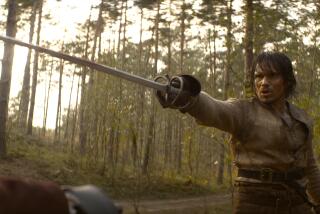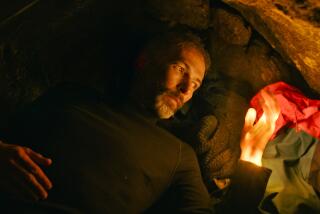Culture : France Loves the Adventurers of the Extreme : * The individual exploit may not be unique to the nation’s culture, but French take it to the edge.
- Share via
PARIS — Why did Frenchman Gerard d’Aboville row his boat across the Pacific Ocean?
After the four-month ordeal--during which he capsized 36 times--D’Aboville claimed that the experience served absolutely no useful purpose and that he hated it from beginning to end. “Everything I did serves nothing. There is nothing that can be learned from it,” he said, “But I succeeded.”
D’Aboville’s virtual dismissal of his accomplishment did not dim the glory reflected in the eyes of his fellow Frenchmen, however. If anything, his self-denigration enhanced his image. France is not an “I’m the Greatest” kind of country. To be acceptable, conceit needs to be hidden behind layers of seeming indifference.
Since returning home after his solitary voyage from Japan to the coast of Washington state, D’Aboville has been treated like a national hero. Hosted on talk shows, deified in the popular press, courted by publishers, consulted by philosophers--the balding 46-year-old former business school dropout has been bathed in the kind of national homage that only the country that produced Napoleon can render. A recent poll by the photo magazine Paris Match listed D’Aboville as the newsmaker who most fascinated Frenchmen. He easily outdistanced the entire political class of France and such foreign competition as Terry Waite, the recently released British hostage, who was kidnaped in Lebanon while trying to negotiate the release of Western hostages.
His reception is in keeping with the trend of recent years in which the cult of the solitary adventurer has become a passion in France.
“Let’s call them the ‘adventurers of the extreme’ for lack of a better definition,” the magazine L’Express suggested in an analysis of the D’Aboville phenomenon. “Gerard d’Aboville is at the prow, the latest link in a chain that has even business executives jumping into canyons on bungee cords.”
By venturing alone across the Pacific, D’Aboville joined a pantheon of historical French adventurers that includes such heroes as Charles Blondin, who in 1857 was the first man to traverse Niagara Falls on a tightrope (two years later he repeated the feat carrying his manager on his back); Sylvain Dornon, who in 1891 walked from Paris to Moscow on stilts; Alain Bombard, who in 1952 spent 113 days on a raft in the Atlantic Ocean with nothing for food but plankton, and Jean-Louis Etienne, who in 1986 spent 63 days walking alone to the North Pole.
Gerard Mermet, editor of an annual publication, Francoscopie, which monitors trends in French life, said the recent wave of adventure worship dates to the solo sailboat exploits by Frenchman Eric Tabarly, who in 1980 set the one-man speed record for crossing the Atlantic.
“It was Tabarly who returned to the French the possibility of winning back through such exploits that which they had lost in other domains.”
Although the individual exploit--solitary man or woman against unforgiving nature--is certainly not unique to French culture, it is often the French who take it to its most existential extremes. The popularity of the Paris-Dakar motor rally across the Sahara each winter is just one example of the desire among the French to test themselves against the elements or voluntarily place themselves in dangerous situations. (D’Aboville himself competed in the Saharan race three times, in 1980, 1986 and 1988, riding on 125-cc. motorcycles.)
In the 13 years of the Paris-Dakar rally, more than 25 people have died in the three-week ordeal across 8,000 miles. In 1988, five people were killed and more than 50 injured. But it only heightened the French interest for the event.
Paris Match once termed it “the cruel and magnificent Paris-Dakar.” This year’s race is slated to begin Dec. 23 in Paris with more interest than ever.
But the thirst for adventure also shows up in other domains, such as the disproportionate number of French free-lance photographers in war zones and the ready stream of French volunteers for risky international relief organizations such as Medecins Sans Frontieres--Doctors Without Borders.
“There are two kinds of motivation for the volunteers,” said Francois Luiggi, a recruiting officer for the Medecins Sans Frontieres in Paris. “The first is a feeling of compassion for the people and the second is a curiosity about the unknown and about whether they (the volunteers) have what it takes to live in a strange land.” Last year, Medecins Sans Frontieres sent 850 young French doctors trekking off into remote wilds. Another 2,000 doctors are on call for medical crises like the civil war in Yugoslavia.
It is not surprising that three of the country’s most popular television shows are about journeys to remote lands, life-threatening stunts and adventures in nature.
The most popular of the three, named after a city at the remote tip of South America, is called “Ushuaia: Magazine of the Extreme,” and it has seen its host Nicolas Hulot jump from airplanes, descend into underwater caves, swim in an Indian Ocean shark reserve and wrestle with deadly poisonous sea snakes. Recently, Hulot was in the northern reaches of Canada organizing a long-distance snowmobile race.
Unlike Jacques Cousteau, the internationally famed French naturalist who emphasizes conservation and the examination of rare and endangered wildlife in his popular programs, Hulot puts the stress on adventure and personal challenge.
“There has always been a thirst for adventure in French life--just look at the best sellers by Jules Verne,” said Philippe Vilamitjana, producer-editor of a rival adventure show, “Thalassa” (“sea” in Greek), on another network. “What’s different today is the spectacle of adventure, the exploit, the extreme, the search for the unusual, the out of reach. . . .”
In the same vein, travel agencies feature popular new tours entitled “voyages to the extreme” that include dangerous mountain climbs and treks in the Sahara desert.
What is it that makes thousands of French want to break out of their civilized life of comforts and plunge into a hostile, dangerous environment?
Is it what the poet Charles Baudelaire noted more than a century ago: “This country bores us.”
Or is it what French sociologist David Le Breton, author of a recent book on what he calls “the new adventurism” claims is a “crisis of meaning and values in our society.”
Maurice Herzog, a famed French mountain climber who was the first human being to scale a 26,000-foot peak (Mt. Annapurna in Nepal in 1950), thinks it is a combination of the two.
“Daily existence is bland and ordinary,” said Herzog, 72, who lost most of his fingers and toes to frostbite in the ascent of Annapurna. “I think that when there is an act of bravura like that of D’Aboville it makes people believe they truly exist and are worthy to be called men and women.”
“Also,” said Herzog, “we have fallen into a very low period in politics. The demonstration of courage by a Frenchman--a true Frenchman like D’Aboville--helps us forget this atmosphere of morosity that surrounds us.”
“There is a lot of symbolism involved here,” said Le Breton in an interview with L’Express. “Modern life does not give us enough reasons to live. It has engendered a crisis of meaning and values. We ask: ‘Why are we on the Earth?’ The decline of religion has accelerated the process: now we create our own sense of the sacred through self challenge. We no longer go toward God but rather toward ourselves. By flirting with death, the types like D’Aboville give a boost of meaning to their existence.”
Indeed, the exploit of D’Aboville had its quasi-religious aspects. The French press, for example, constantly referred to his ordeal as his “Calvary,” referring to the site in Jerusalem where Jesus Christ is said to have been crucified.
As the first picture in a 25-page spread on D’Aboville, the editors of Paris Match chose an eerie self-portrait taken by D’Aboville during a storm. Eyes bulging with terror, the picture shows blood pouring from his forehead where he received a gash when his boat capsized. “I didn’t even recognize myself when I saw that photograph,” D’Aboville joked in a telephone interview.
To Le Breton, displaying the wound is a way of “authenticating the experience.”
“The more the body is wounded, the more it is tested,” said the sociologist, who went to live in a remote region of Brazil as his personal test of existence. “The more it shows the authenticity of the experience.”
Oarsman D’Aboville said he sees absolutely no religious or higher meaning to his experience.
He explained his popularity as a reflection of French individualism.
“I think you Americans are more into collective activity,” he said. “I think the French are individualists who like to see the little Frenchman do something dangerous without too much technology involved.”
More to Read
Sign up for Essential California
The most important California stories and recommendations in your inbox every morning.
You may occasionally receive promotional content from the Los Angeles Times.










